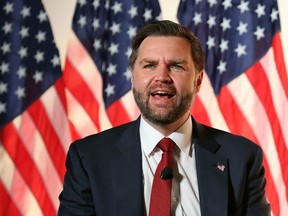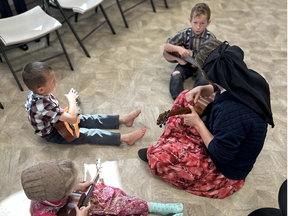Politics
J.D. Vance Critiques Canada’s Immigration Policies Amid Economic Concerns

U.S. Vice President J.D. Vance has sharply criticized Canada’s immigration policies and economic management, attributing the nation’s current economic stagnation to decisions made by the Liberal Party. His remarks, shared on social media platform X, quickly gained traction, prompting widespread discussion regarding Canada’s living standards and immigration strategy.
Vance’s commentary followed a viral post from Michael A. Arouet, which featured a graph from Ice Cap Asset Management highlighting Canada’s declining living standards compared to those of the United Kingdom and the United States. Arouet’s post, which has garnered over 1.4 million views, suggested that Canada’s predicament serves as a historical example of self-destruction resulting from adherence to leftist ideologies.
In his own post, Vance remarked, “While I’m sure the causes are complicated, no nation has leaned more into ‘diversity is our strength’ and ‘we don’t need a melting pot, we have a salad bowl’ immigration insanity than Canada,” noting the country’s status as having the highest foreign-born population share among G7 nations. His statement has reached approximately 1.8 million views. Vance emphasized that these immigration policies correlate with stagnant living standards in Canada.
Analyst Richard Dias from Ice Cap Asset Management echoed Vance’s concerns, sharing another graph that illustrated Canada’s low ranking in per-capita growth among OECD countries. Dias simply stated, “Agreed,” reinforcing the sentiment of Vance’s critique.
Vance further articulated his perspective on Canada’s political landscape, addressing Canadians directly: “With all due respect to my Canadian friends, your stagnating living standards have nothing to do with Donald Trump or whatever bogeyman the CBC tells you to blame. The fault lies with your leadership, elected by you.” His comments have sparked a range of reactions, many attributing the blame to former Prime Minister Justin Trudeau for increasing immigration levels that some believe have strained national resources.
In a related development, Conservative Party Leader Pierre Poilievre shared the same graph as Vance earlier this week, framing it as “the cost of Prime Minister Mark Carney.” He linked Carney’s policies to rising inflation and declining living standards, arguing that the same financial challenges faced in the UK during Carney’s tenure are now manifesting in Canada.
A recent study by the Fraser Institute painted a concerning picture of Canada’s economic health. Co-author Lawrence Schembri explained that from 2020 to 2024, Canada experienced overall economic growth, yet faced a 2% decline in GDP-per-capita. He characterized this situation as “ugly,” highlighting weak investment growth alongside significant immigration influx.
The head of the Bank of Canada, Tiff Macklem, also expressed concerns about diminishing living standards, warning that “unless something changes, our incomes will be lower than they otherwise would be.”
Statistics reveal a stark contrast between Canada and the United States regarding GDP per capita, with the U.S. at over USD 89,000 compared to Canada’s approximately USD 55,000. A national poll conducted by Leger for the Association for Canadian Studies found that 62% of Canadians believe the country is admitting too many immigrants. Trust in immigrants was also questioned, with only 42% of respondents expressing confidence, a figure that drops to 36% regarding refugees.
The ongoing challenges in Canada’s immigration system have prompted criticism from various quarters. Recently, Mark Weber, president of the Customs and Immigration Union, testified before Parliament, revealing that security screenings for refugees have been compromised due to staffing shortages. “To speed things up, we are allowing people into the country without first doing security screening,” Weber stated, indicating a significant shift in protocol.
As the debate continues, Conservative immigration critic Michelle Rempel Garner plans to advocate for overhauling how Canada addresses asylum claims, particularly concerning individuals entering from other G7 countries.
The political landscape remains contentious, with Prime Minister Carney and U.S. President Donald Trump at odds over trade issues, including tariffs and the prospect of Canada being perceived as the “51st state.”
As discussions surrounding immigration and economic policy intensify, the implications for Canada’s future remain uncertain. The intersection of immigration, economic performance, and political accountability will likely continue to dominate discourse in the months ahead.
-

 Politics3 weeks ago
Politics3 weeks agoSecwepemc First Nation Seeks Aboriginal Title Over Kamloops Area
-

 World4 months ago
World4 months agoScientists Unearth Ancient Antarctic Ice to Unlock Climate Secrets
-

 Entertainment5 months ago
Entertainment5 months agoTrump and McCormick to Announce $70 Billion Energy Investments
-

 Lifestyle4 months ago
Lifestyle4 months agoTransLink Launches Food Truck Program to Boost Revenue in Vancouver
-

 Science5 months ago
Science5 months agoFour Astronauts Return to Earth After International Space Station Mission
-

 Technology3 months ago
Technology3 months agoApple Notes Enhances Functionality with Markdown Support in macOS 26
-

 Top Stories2 months ago
Top Stories2 months agoUrgent Update: Fatal Crash on Highway 99 Claims Life of Pitt Meadows Man
-

 Lifestyle3 months ago
Lifestyle3 months agoManitoba’s Burger Champion Shines Again Amid Dining Innovations
-

 Politics4 months ago
Politics4 months agoUkrainian Tennis Star Elina Svitolina Faces Death Threats Online
-

 Sports5 months ago
Sports5 months agoSearch Underway for Missing Hunter Amid Hokkaido Bear Emergency
-

 Politics4 months ago
Politics4 months agoCarney Engages First Nations Leaders at Development Law Summit
-

 Technology5 months ago
Technology5 months agoFrosthaven Launches Early Access on July 31, 2025




















